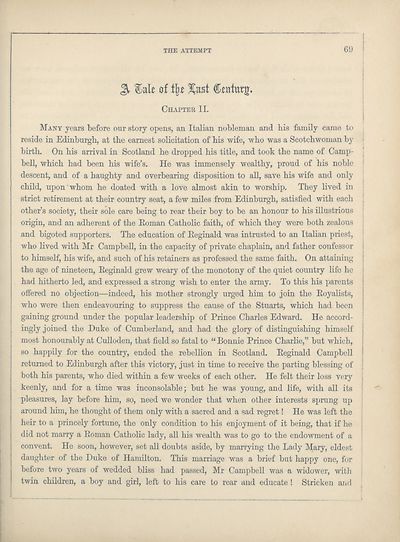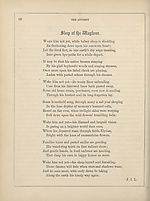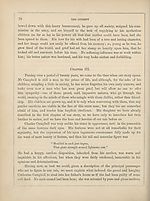Attempt > Volume 1 and Select writings
(81) Page 69
Download files
Complete book:
Individual page:
Thumbnail gallery: Grid view | List view

THE ATTEMPT
61)
& ®ale of % %ast Ctnfurg.
Chapter II.
Many years before our story opens, an Italian nobleman and his family came to
reside in Edinburgh, at the earnest solicitation of bis wife, who was a Scotchwoman by
birth. On his arrival in Scotland he dropped his title, and took the name of Camp¬
bell, which had been his wife’s. He was immensely wealthy, proud of his noble
descent, and of a haughty and overbearing disposition to all, save his wife and only
child, upon whom he doated with a love almost akin to worship. They lived in
strict retirement at their country seat, a few miles from Edinburgh, satisfied with each
other’s society, their sole care being to rear their boy to be an honour to his illustrious
origin, and an adherent of the Koman Catholic faith, of which they were both zealous
and bigoted supporters. The education of Eeginald was intrusted to an Italian priest,
who lived with Mr Campbell, in the capacity of private chaplain, and father confessor
to himself, his wife, and such of his retainers as professed the same faith. On attaining
the age of nineteen, Reginald grew weary of the monotony of the quiet country life he
had hitherto led, and expressed a strong wish to enter the army. To this his parents
offered no objection—indeed, his mother strongly urged him to join the Royalists,
who were then endeavouring to suppress the cause of the Stuarts, which had been
gaining ground under the popular leadership of Prince Charles Edward. He accord¬
ingly joined the Duke of Cumberland, and had the glory of distinguishing himself
most honourably at Culloden, that field so fatal to “ Bonnie Prince Charlie,” but which,
so happily for the country, ended the rebellion in Scotland. Reginald Campbell
returned to Edinburgh after this victory, just in time to receive the parting blessing of
both his parents, who died within a few weeks of each other. He felt their loss very
keenly, and for a time was inconsolable; but he was young, and life, with all its
pleasures, lay before him, so, need we wonder that when other interests sprung up
around him, he thought of them only with a sacred and a sad regret! He was left the
heir to a princely fortune, the only condition to his enjoyment of it being, that if he
did not marry a Roman Catholic lady, all his wealth was to go to the endowment of a
convent. He soon, however, set all doubts aside, by marrying the Lady Mary, eldest
daughter of the Duke of Hamilton. This marriage was a brief but happy one, for
before two years of wedded bliss had passed, Mr Campbell was a widower, with
twin children, a boy and girl, left to his care to rear and educate ! Stricken and
61)
& ®ale of % %ast Ctnfurg.
Chapter II.
Many years before our story opens, an Italian nobleman and his family came to
reside in Edinburgh, at the earnest solicitation of bis wife, who was a Scotchwoman by
birth. On his arrival in Scotland he dropped his title, and took the name of Camp¬
bell, which had been his wife’s. He was immensely wealthy, proud of his noble
descent, and of a haughty and overbearing disposition to all, save his wife and only
child, upon whom he doated with a love almost akin to worship. They lived in
strict retirement at their country seat, a few miles from Edinburgh, satisfied with each
other’s society, their sole care being to rear their boy to be an honour to his illustrious
origin, and an adherent of the Koman Catholic faith, of which they were both zealous
and bigoted supporters. The education of Eeginald was intrusted to an Italian priest,
who lived with Mr Campbell, in the capacity of private chaplain, and father confessor
to himself, his wife, and such of his retainers as professed the same faith. On attaining
the age of nineteen, Reginald grew weary of the monotony of the quiet country life he
had hitherto led, and expressed a strong wish to enter the army. To this his parents
offered no objection—indeed, his mother strongly urged him to join the Royalists,
who were then endeavouring to suppress the cause of the Stuarts, which had been
gaining ground under the popular leadership of Prince Charles Edward. He accord¬
ingly joined the Duke of Cumberland, and had the glory of distinguishing himself
most honourably at Culloden, that field so fatal to “ Bonnie Prince Charlie,” but which,
so happily for the country, ended the rebellion in Scotland. Reginald Campbell
returned to Edinburgh after this victory, just in time to receive the parting blessing of
both his parents, who died within a few weeks of each other. He felt their loss very
keenly, and for a time was inconsolable; but he was young, and life, with all its
pleasures, lay before him, so, need we wonder that when other interests sprung up
around him, he thought of them only with a sacred and a sad regret! He was left the
heir to a princely fortune, the only condition to his enjoyment of it being, that if he
did not marry a Roman Catholic lady, all his wealth was to go to the endowment of a
convent. He soon, however, set all doubts aside, by marrying the Lady Mary, eldest
daughter of the Duke of Hamilton. This marriage was a brief but happy one, for
before two years of wedded bliss had passed, Mr Campbell was a widower, with
twin children, a boy and girl, left to his care to rear and educate ! Stricken and
Set display mode to: Large image | Transcription
Images and transcriptions on this page, including medium image downloads, may be used under the Creative Commons Attribution 4.0 International Licence unless otherwise stated. ![]()
| Ladies' Edinburgh Debating Society publications > Attempt > Volume 1 and Select writings > (81) Page 69 |
|---|
| Permanent URL | https://digital.nls.uk/109865926 |
|---|
| Attribution and copyright: |
|
|---|

